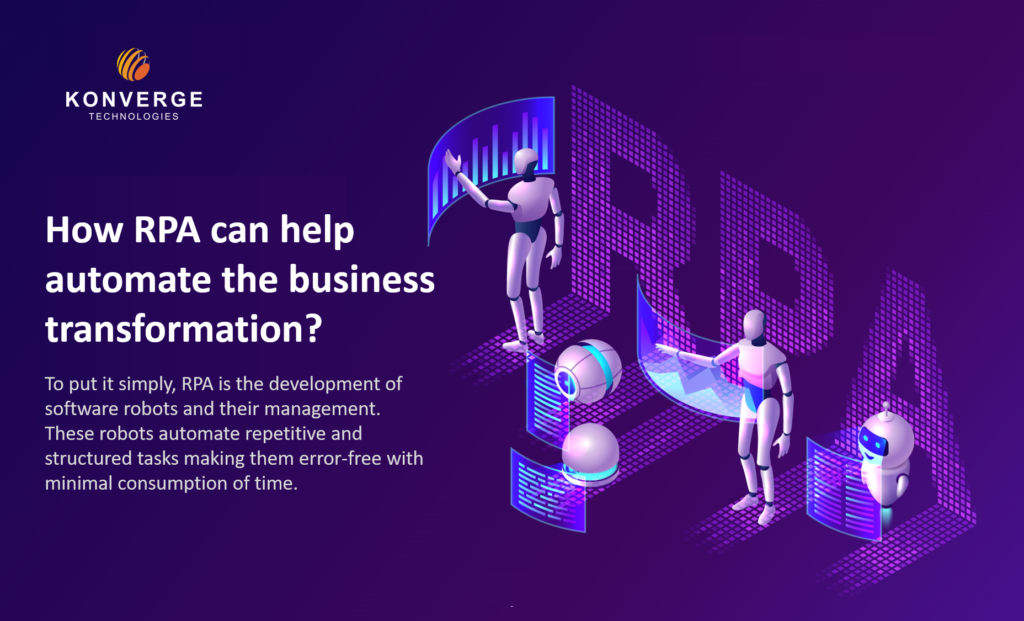
How RPA can help automate the business transformation?

In recent years, companies have begun transitioning towards digitisation which has led to the massive adoption of advanced technology. This has been a common denominator among all the major industries around the globe and RPA is one of the first steps towards this transformation journey.
Robotic Process Automation or RPA helps organisations to rapidly adapt to these digitisation changes and helps in reducing cost, improving customer experience, optimizing operations, improving management and have a better control through intelligent automation and gain quick ROI. RPA technology not only supports digital transformation but also helps in optimising the staff capability by reducing their workload and relieving them off work that can be easily automated through process automation.
How to understand RPA in a sentence?
To put it simply, RPA is the development of software robots and their management. These robots automate repetitive and structured tasks making them error-free with minimal consumption of time.
How does RPA help in business transformation?
RPA automation has a huge potential of ensuring quick and error-free service delivery to improve customer satisfaction. Benefits of RPA include a plethora of productivity-enhancing automation processes. Some of the most important benefits of RPA are listed below which are helping businesses to automate their business and achieve their goals faster.
1. Leaving staff free for doing high-value task
RPA automation helps in reducing the tasks of employees and leaving them free for doing only high-value tasks. Through automation, tasks like data entry, answering repetitive queries; etc is done automatically which leaves employees to focus on other important tasks. It empowers the employees by relieving them from dull ordinary daily errands.
2. Better business and operation control
RPA brings with it, problem-solving abilities for issues arising with outsourcing teams and third party involvement. It automates all such work and provides you with an in-house staff without any extra expenditure. This ensures better control of the operations and the business.
3. Cost reduction
RPA tools automate a lot of processes. These processes are not only time-efficient but also help in reducing the wage cost. It automates the manual work ensuring round the clock availability of services for customers.
4. Reducing Operational risks
Human errors are nearly impossible to be eliminated but with RPA solutions the risk of errors is reduced substantially.
5. Quick service
RPA replaces human intervention in certain business tasks and customer service is one of them. RPA helps in rapid delivery of customer service for 24*7, ensuring smooth service to customers and filtering frequently asked queries. This not only streamlines the office work but also improves the customer experience.
6. Data Collection
7. Improved interoperability
RPA connects the entire business process which improves the coordination among departments and operations. Conjoined interoperability is established with lesser errors.
8. Developing expertise
When employees are not busy doing mundane tasks, they can develop expertise in different domains of the business. This enhances productivity and efficiency.
9. Accuracy
RPA ensures error-free and accurate service. It is capable of eliminating process errors and map business strategies, optimizing the business processes.
10. Improvement in the analytical abilities
Through RPA, businesses can make better business forecasts. RPA enhances the analytical abilities of the organisation by ensuring the gathering of accurate and quality data. Since it is far more intelligent and efficient than humans, it collects data systematically, tracks it, and stores unstructured and structured data. It also analyzes the accurately collect data and creates reports which help in making better and informed business decisions. It provides a better result oriented report and forecasts for the business.
11. Scalability
RPA enables scaling up the operation based on the requirements of the company. For example, e-commerce websites can increase their workforce with virtual assistants during seasonal sales and respond to first level customer queries without having to involve staff until required. Similarly, they can reduce the workforce when not required.
12. Better ROI
RPA reduces a lot of manual processes and itself requires very less investment compared to hiring a full-time employee. It reduces a lot of operation costs by automating processes. Thus it gives you a good ROI.
13. Develops a digital roadmap
RPA is the first stage of digital transformation that helps companies to create a digital roadmap. After the first deployment of RPA, companies get a wide view of what automation can do which helps them in the future automation plans like combining RPA with AI, NLP, etc.
There are a lot of RPA technology solution providers who help companies in automating not only their mundane but complex tasks. It is valuable to lay the foundation of digital transformation and make a breakthrough automated process eliminating business hurdles and technical burdens and RPA is a way to start doing it.
Recent Posts


Future of Network Security: Cisco Solutions for Hybrid Work


